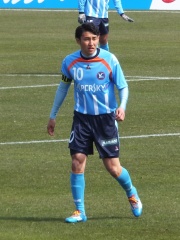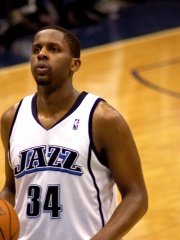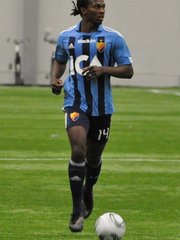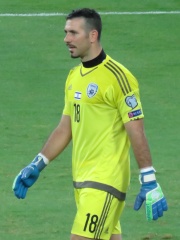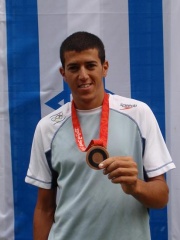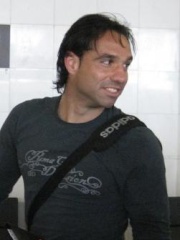Soccer Player
Itay Shechter
1987 - today
EN.WIKIPEDIA PAGE VIEWS (PV)

 Itay Shechter
Itay Shechter
Itay Menachem Shechter (or Etey Schechter, Hebrew: איתי שכטר; born 22 February 1987) is a retired Israeli professional footballer who played as a striker. Read more on Wikipedia
His biography is available in 15 different languages on Wikipedia. Itay Shechter is the 17,518th most popular soccer player (down from 14,393rd in 2024), the 493rd most popular biography from Israel (down from 449th in 2019) and the 46th most popular Israeli Soccer Player.
Memorability Metrics
Page views of Itay Shechter by language
Among Soccer Players
Among soccer players, Itay Shechter ranks 17,518 out of 21,273. Before him are David Terans, Yusuke Kawakita, Eijiro Mori, Housain Al-Mogahwi, Yohei Onishi, and Timo Baumgartl. After him are Benjamin Siegrist, Roger Martí, Joãozinho, Abdulla Yusuf Helal, Akio Yoshida, and Sebastián Pinto.
Most Popular Soccer Players in Wikipedia
Go to all RankingsDavid Terans
1994 - Present
HPI: 37.18
Rank: 17,531
Yusuke Kawakita
1978 - Present
HPI: 37.18
Rank: 17,532
Eijiro Mori
1986 - Present
HPI: 37.18
Rank: 17,533
Housain Al-Mogahwi
1988 - Present
HPI: 37.18
Rank: 17,534
Yohei Onishi
1982 - Present
HPI: 37.18
Rank: 17,535
Timo Baumgartl
1996 - Present
HPI: 37.18
Rank: 17,536
Itay Shechter
1987 - Present
HPI: 37.18
Rank: 17,537
Benjamin Siegrist
1992 - Present
HPI: 37.18
Rank: 17,538
Roger Martí
1991 - Present
HPI: 37.18
Rank: 17,539
Joãozinho
1988 - Present
HPI: 37.18
Rank: 17,540
Abdulla Yusuf Helal
1993 - Present
HPI: 37.17
Rank: 17,541
Akio Yoshida
1986 - Present
HPI: 37.17
Rank: 17,542
Sebastián Pinto
1986 - Present
HPI: 37.17
Rank: 17,543
Contemporaries
Among people born in 1987, Itay Shechter ranks 1,305. Before him are Modibo Diakité, Uffie, C. J. Miles, Ryan Shawcross, Daniel Adlung, and Cristian Maidana. After him are Yohei Fukumoto, Kristijan Đurasek, Kebba Ceesay, Cenk Akyol, Tim Ream, and Melissa Horn.
Others Born in 1987
Go to all RankingsModibo Diakité
SOCCER PLAYER
1987 - Present
HPI: 37.21
Rank: 1,299
Uffie
SINGER
1987 - Present
HPI: 37.21
Rank: 1,300
C. J. Miles
BASKETBALL PLAYER
1987 - Present
HPI: 37.21
Rank: 1,301
Ryan Shawcross
SOCCER PLAYER
1987 - Present
HPI: 37.20
Rank: 1,302
Daniel Adlung
SOCCER PLAYER
1987 - Present
HPI: 37.20
Rank: 1,303
Cristian Maidana
SOCCER PLAYER
1987 - Present
HPI: 37.19
Rank: 1,304
Itay Shechter
SOCCER PLAYER
1987 - Present
HPI: 37.18
Rank: 1,305
Yohei Fukumoto
SOCCER PLAYER
1987 - Present
HPI: 37.16
Rank: 1,306
Kristijan Đurasek
CYCLIST
1987 - Present
HPI: 37.16
Rank: 1,307
Kebba Ceesay
SOCCER PLAYER
1987 - Present
HPI: 37.16
Rank: 1,308
Cenk Akyol
BASKETBALL PLAYER
1987 - Present
HPI: 37.15
Rank: 1,309
Tim Ream
SOCCER PLAYER
1987 - Present
HPI: 37.15
Rank: 1,310
Melissa Horn
MUSICIAN
1987 - Present
HPI: 37.15
Rank: 1,311
In Israel
Among people born in Israel, Itay Shechter ranks 493 out of NaN. Before him are Ofir Marciano (1989), Amir Weintraub (1986), Dekel Keinan (1984), Klemi Saban (1980), Eden Ben Basat (1986), and Omer Damari (1989). After him are Omer Golan (1982), Shahar Tzuberi (1986), Elyanna (2002), Eliran Atar (1987), Nir Bitton (1991), and Shira Rishony (1991).
Others born in Israel
Go to all RankingsOfir Marciano
SOCCER PLAYER
1989 - Present
HPI: 37.85
Rank: 487
Amir Weintraub
TENNIS PLAYER
1986 - Present
HPI: 37.48
Rank: 488
Dekel Keinan
SOCCER PLAYER
1984 - Present
HPI: 37.48
Rank: 489
Klemi Saban
SOCCER PLAYER
1980 - Present
HPI: 37.47
Rank: 490
Eden Ben Basat
SOCCER PLAYER
1986 - Present
HPI: 37.28
Rank: 491
Omer Damari
SOCCER PLAYER
1989 - Present
HPI: 37.26
Rank: 492
Itay Shechter
SOCCER PLAYER
1987 - Present
HPI: 37.18
Rank: 493
Omer Golan
SOCCER PLAYER
1982 - Present
HPI: 37.17
Rank: 494
Shahar Tzuberi
ATHLETE
1986 - Present
HPI: 36.96
Rank: 495
Elyanna
SINGER
2002 - Present
HPI: 36.79
Rank: 496
Eliran Atar
SOCCER PLAYER
1987 - Present
HPI: 36.71
Rank: 497
Nir Bitton
SOCCER PLAYER
1991 - Present
HPI: 36.52
Rank: 498
Shira Rishony
ATHLETE
1991 - Present
HPI: 36.43
Rank: 499
Among Soccer Players In Israel
Among soccer players born in Israel, Itay Shechter ranks 46. Before him are Nir Davidovich (1976), Ofir Marciano (1989), Dekel Keinan (1984), Klemi Saban (1980), Eden Ben Basat (1986), and Omer Damari (1989). After him are Omer Golan (1982), Eliran Atar (1987), Nir Bitton (1991), Almog Cohen (1988), Taleb Tawatha (1992), and Liel Abada (2001).
Nir Davidovich
1976 - Present
HPI: 38.73
Rank: 40
Ofir Marciano
1989 - Present
HPI: 37.85
Rank: 41
Dekel Keinan
1984 - Present
HPI: 37.48
Rank: 42
Klemi Saban
1980 - Present
HPI: 37.47
Rank: 43
Eden Ben Basat
1986 - Present
HPI: 37.28
Rank: 44
Omer Damari
1989 - Present
HPI: 37.26
Rank: 45
Itay Shechter
1987 - Present
HPI: 37.18
Rank: 46
Omer Golan
1982 - Present
HPI: 37.17
Rank: 47
Eliran Atar
1987 - Present
HPI: 36.71
Rank: 48
Nir Bitton
1991 - Present
HPI: 36.52
Rank: 49
Almog Cohen
1988 - Present
HPI: 35.60
Rank: 50
Taleb Tawatha
1992 - Present
HPI: 35.31
Rank: 51
Liel Abada
2001 - Present
HPI: 32.90
Rank: 52










